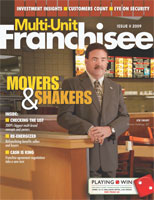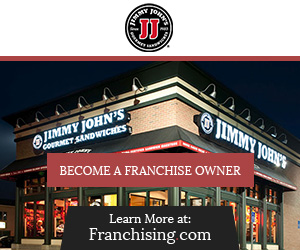Fear Is the Enemy: Survival Tips For Restaurateurs--and Others!
Business cycles are the norm and while difficult to predict, peaks and valleys in our economy will always occur. However, the speed and magnitude of deterioration in worldwide business conditions and financial markets make the current recession especially severe. As everyone now knows, this is not a normal trough or business cycle; survival and success during these times will require extraordinary actions.
So what actions should restaurant companies consider to persevere in this extraordinary economic environment? The first critical point to remember is that "Fear is the Enemy." It is easy to become paralyzed by the current state of affairs and take no action, waiting and hoping that conditions will improve. Understandably, every company's situation is different and current actions will be dictated by individual circumstances.
Nevertheless, despite the natural tendency to sit back and wait for this storm to pass, restaurateurs should be proactive in dealing with the current environment and positioning their businesses for the future. Below are some insights and observations to improve your competitive position--whether your business is distressed, maintaining its status quo, or outperforming the market.
1) Distressed
Sales are struggling and input costs have risen over the past two years, resulting in lower profit margins. Your ability to meet current financial obligations is in jeopardy and becomes more tenuous with each passing month. Absolute survival has to be the primary focus for a restaurant company in this situation. The time has arrived for drastic action. This is the time for an objective assessment of current operating dynamics, cash reserves, and realistic projections to facilitate the going concern status of the business.
Survival will almost always require cooperation and participation from the company's outside relationships to find solutions. A critical first step in the process is establishing open communication with the company's key third-party providers. Banks, landlords, franchisors, business partners, and vendors must be engaged at the earliest signs of trouble. Companies can expect more oversight in their businesses relating to staffing levels, operating practices, and discretionary spending. Operators must also contemplate significant changes in the cost structure of the business. Cost-cutting and outsourcing opportunities must be explored with great diligence. Significant overhead, structural, and compensation changes are common steps that can be implemented rapidly with immediate short-term benefits to cash flow. Some companies have instituted creative compensation plans with incentives for employees, and also have implemented best practices used by other operators.
Keep in mind that for most distressed operators, the goal is to survive to benefit from a future upturn in the business. In most cases, lenders, franchisors, and other stakeholders don't want to own or operate the restaurants. Proactive companies that plan, communicate, and adapt their businesses usually survive and can thrive when the business cycle turns.
2) Status quo
Sales volumes are within an acceptable trading range (up or down) and margins have been affected by higher costs and lower check averages. However, you are starting to see some relief in the form of reduced commodity costs, manageable labor staffing, and the company is maintaining its position in a very trying economy. While you are not in any immediate financial distress, the overall financial condition and performance of your company is feeling the impact of the recession. Capital has tightened considerably and the ability to refinance, recapitalize, or grow is limited.
Turn your attention inward. Take advantage of a challenging environment to review every aspect of your business. During periods of rapid growth and prosperity, companies often lack the time to focus on infrastructure, revise operational practices, and establish long-term strategic objectives. Slower periods of economic activity provide a window of opportunity to address these critically important items. Your focus should be on preparing to take action when the economy starts to improve.
Formulating a strategic plan for the future is of paramount importance during this period. Spend this time establishing a formal long-term plan that addresses organic growth, acquisitions, capital structure, management, succession planning, and exit strategies. Too often these topics are not addressed or formally planned. Remember, "If you don't know where you are going, any road will get you there."
Regardless of the current economic situation, there are steps you can take to position your business for the recovery. Streamline your operations without affecting service. In addition to cost savings, establish revised goals for your business that are realistic and attainable. Make sure your operational goals are consistent with your broader strategic plans. The key will be to balance risk and reward. Decide where you want to be when conditions improve and develop a plan that provides the most likely path to get there.
Finally, meet with your bank and other financial institutions so you can take advantage of your solid operating history and position yourself to access capital at the early stages of the recovery. With credit quality deteriorating, banks are eager to maintain relationships with those viewed as "good credits." Reach out to vendors and explore structural and other alternatives that can benefit your company. Vendors do not want to lose customers in this environment.
3) Outperforming
Business is strong, margins are improving, and while you may not be setting sales records, you're clearly outperforming the competition. Get off the bench. This is your time! Your strategy should be centered on leveraging the current financial and operational strength of your company to pursue opportunities presented by this economic downturn that distressed and status quo companies are unable to consider. Review your current and planned strategic position and execute.
Opportunities to consider should include: strategic acquisitions (lower multiples, fewer bidders); distressed acquisitions (potential for large returns); real estate and site acquisitions (prices down, availability high); and construction projects such as new unit development and remodeling (costs are down, labor is available). Additionally, you should be thinking about human capital and partnering with or hiring better managers. There will be an increase in the availability of quality talent looking to partner with higher-quality operators.
Leverage your financial strength wherever possible. Work with your lenders to improve the structure and terms of your financing and overall capitalization. Collaborate with vendors to find additional incentives and terms that can benefit your company and potentially theirs as well. Finally, don't overlook your existing operations. The environment is extremely competitive with some companies becoming very aggressive to generate business. Don't lose focus on your current state of affairs. Staying on top as a business can, in many ways, be more difficult than climbing up out of the cellar, so be wary of complacency and encourage and incentivize your employees to be moving forward at all times.
Conclusion
These are uncharted waters for many restaurant companies. Economic times are tough, and even the most seasoned operators are encountering challenges not seen in any previous downturn. As a result, fear and apprehension are pervasive, emotions that can be debilitating and will ultimately lead to the further degradation of conditions for those who fail to address their situation and act. Companies that objectively evaluate their present situation and take proactive steps have the best chance to survive and emerge from this recession. For those who can recognize the unique opportunities of the current environment, fear is replaced by optimism and apprehension is supplanted by anticipation.
Companies, whether distressed or opportunistic, often have strategic and financial alternatives that might not always be obvious in this environment. Don't hesitate to reach out to your network of professionals experienced in these matters to assist you in finding successful solutions.
Dean Zuccarello, CEO and founder of The Cypress Group, has more than 25 years of financial and transactional experience in mergers, acquisitions, divestitures, strategic planning, and financing in the restaurant industry. The Cypress Group is a privately owned investment bank/advisory services firm focused exclusively on the multi-unit and franchise industry for more than 17 years. Contact him at (303) 680-4141 or at [email protected].
Share this Feature
Recommended Reading:
FRANCHISE TOPICS
- Multi-Unit Franchising
- Get Started in Franchising
- Franchise Growth
- Franchise Operations
- Open New Units
- Franchise Leadership
- Franchise Marketing
- Technology
- Franchise Law
- Franchise Awards
- Franchise Rankings
- Franchise Trends
- Franchise Development
- Featured Franchise Stories
FEATURED IN

Multi-Unit Franchisee Magazine: Issue 2, 2009

$250,000





 The multi-unit franchise opportunities listed above are not related to or endorsed by Multi-Unit Franchisee or Franchise Update Media Group. We are not engaged in, supporting, or endorsing any specific franchise, business opportunity, company or individual. No statement in this site is to be construed as a recommendation. We encourage prospective franchise buyers to perform extensive due diligence when considering a franchise opportunity.
The multi-unit franchise opportunities listed above are not related to or endorsed by Multi-Unit Franchisee or Franchise Update Media Group. We are not engaged in, supporting, or endorsing any specific franchise, business opportunity, company or individual. No statement in this site is to be construed as a recommendation. We encourage prospective franchise buyers to perform extensive due diligence when considering a franchise opportunity.